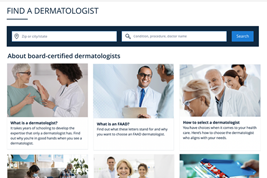Established Advocacy Grant
Two available $10,000 awards.
States that qualify for the Established State Advocacy Grant have received more than two AADA advocacy grant awards and already have a robust advocacy program, but need extra financial support from the AADA to support their advocacy efforts.
Applicants for the Established State Advocacy Grant are encouraged to focus their application on one specific legislative priority, even if the society will be working on multiple priorities throughout the year. This is to demonstrate to the State Policy Committee how exactly the state will be using their grant to further a written plan on that one issue. To clarify, state societies are still encouraged to work on multiple legislative priorities throughout the year, but we are requesting detailed plans for one priority.
Application timeline: The Established State Advocacy Grant application opens on June 30 and closes on Sept. 30.
Apply for the grant
Fill out our online form to apply for the grant.
Apply now
States requesting funding must be able to participate in advocacy activities according to their tax status with the IRS and any applicable state regulations.
The grant application must be strictly for advocacy purposes — to influence legislation and/or regulatory issues or to develop such initiatives.
AADA will not approve any grant applications for proposals that are not aligned with the AADA’s state policy priorities.
Each grantee will be required to submit a final written report (PDF) to the AADA outlining the status of its advocacy project and progress made to date. AADA staff will provide reminders to grantees of the reporting deadlines. Failure to submit a report could result in denial of future funding requests.
Applicants must be prepared to upload the following documents:
1. A comprehensive advocacy project proposal containing the below provisions. View a sample application (PDF download). The advocacy project proposal should specifically address:
State society advocacy background – A complete background includes the history of the society’s advocacy efforts and related activities and a description of both the level of involvement of the society’s leadership and the level of support from the general membership. This background should delineate such details as key society members dedicated to advocacy, state society’s political action committee activities, attendance at grassroots and advocacy training sessions — through the AADA or other sources, and the state society executive director’s attendance at the State Society Executive Conference held in conjunction with the AAD Annual Meeting. Please include all other advocacy objectives for the upcoming legislative session.
Advocacy plan – An advocacy plan is a detailed explanation of the society’s specific goals and objectives, and the activities planned to meet those goals and objectives. This should include such things as discussion of the project timeline, advocacy tools, collaborating/supportive organizations (i.e. state medical society), anticipated outcomes, anticipated challenges/difficulties, and political climate (e.g. strength of legislative sponsor, support from committee chair, partisan issues). If applicable, please also include any information on the qualifications of key personnel, including contract lobbyists. Please describe the likelihood of success if the grant is awarded.
Project budget – This should show the projected total cost of the entire project (this is not a request from the program for that amount of money– the Committee wants to see what the entire project is estimated to cost). A projected budget for the advocacy project includes information on anticipated expenses and anticipated income, specifies how the grant funds will be used, and outlines available funds from the society to be dedicated to this project. Societies that show independent financial effort to support their own initiatives receive greater consideration.
2. List of current and upcoming society officers.
3. Completed W-9 form.
4. Completed form 990.
5. Copy of state society budget from the current year and the proposed budget for the next year, showing income, expenses, and reserve accounts.
6. Optional supporting documents: Letters of support, meeting minutes outlining discussion of proposed activities, advocacy communications from previous years, etc.
7. If your state received a grant in the immediate previous year, you are required to submit a report to the AADA outlining the status of your state’s advocacy project and progress made to date. Societies in states that remain in session during the application period must still submit a status report of the project. Failure to submit a report could result in denial of future funding requests.
 Find a Dermatologist
Find a Dermatologist
 Member directory
Member directory
 AAD Learning Center
AAD Learning Center
 2026 AAD Annual Meeting
2026 AAD Annual Meeting
 Need coding help?
Need coding help?
 Reduce burdens
Reduce burdens
 Clinical guidelines
Clinical guidelines
 Why use AAD measures?
Why use AAD measures?
 Latest news
Latest news
 New insights
New insights
 Physician wellness
Physician wellness
 Joining or selling a practice?
Joining or selling a practice?
 Promote the specialty
Promote the specialty
 Advocacy priorities
Advocacy priorities
